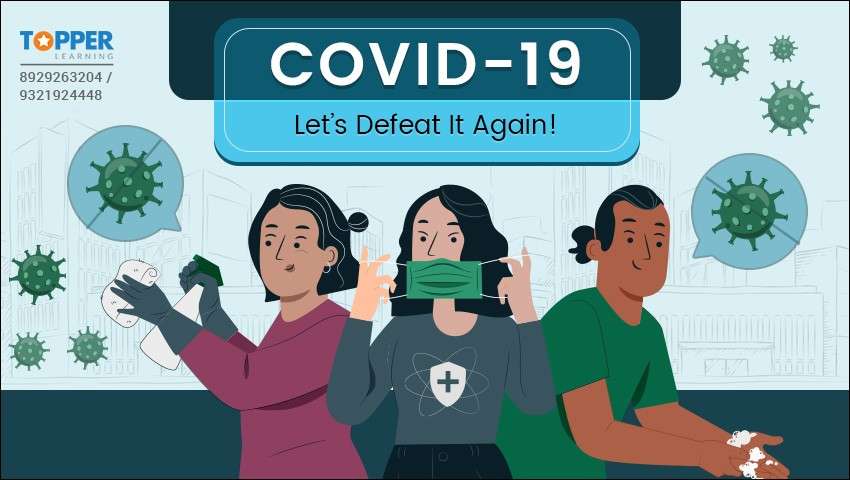COVID-19: Let’s Defeat It Again!

The cases of COVID-19 through the JN.1 variant are on the rise in India and other countries. Boosting your immune system & getting vaccinated are smart moves that help combat the arising. However, importance of precautionary measures can’t be neglected.
By Topperlearning Expert 21st Dec, 2023 | 06:57 pm
ShareCOVID-19 marked the lowest phase of the planet Earth. With innumerable deaths and lockdowns, the putting on of masks became a new normal for the time being. The increase in concern over recent news on the spread of COVID-19 is obvious. However, based on evidence of the current situation, precautionary measures are capable of combating the disease, giving us better victory over the deadly virus. Learn the current situation and get the answers to basic queries concerning COVID-19.
SARS-CoV-2 - JN.1 Variant
The present news headlines indicate the cases of a new variant of COVID-19 in India and multiple other countries named as the JN.1 variant and considered it is a ‘Variant of Interest’ (VOI) due to its rapid spread, the currently available evidence marks it as a ‘low’ health risk posed to the public at the global level. Inherent immunity of people and acquired immunity due to booster vaccines is expected to combat the current variant and impart protection against symptoms and severe disease.
Furthermore, an understanding of Omicron, which has been active for around two years, gives us better chances to gain insight into the structure of the new variant. However, the countries approaching the winter season are warned by the WHO to remain conscious and be prepared for the respiratory burden due to COVID-19 and other similar infections.
Reason For Outbreak
As of December 21st, 2023, around 2,669 active cases have been reported, with 13 cases in Maharashtra and 292 cases in Kerala. Some deaths have also been reported. The current infection is due to the JN.1 variant, which evolved from the Pirola variant (BA.2.86), which further stems from the Omicron sub-variant. The development of new variants and varying infectious abilities of the COVID-19 virus are supposed to have arisen from mutation.
The mutation in the JN.1 variant has been seen in both spike and non-spike proteins, primarily responsible for attaching to human cells, marking a fixed spot and increasing transmissibility. Besides, the mutation also imparts additional protection to evade the human immune response, marking the reason for its outbreak.
Symptoms of New COVID-19 Variant
The JN.1 variant of COVID-19 is seen to produce mild to moderate symptoms, which include:
- Fever
- Cough
- Runny nose
- Headaches
- Sore throat
- Body ache
- Extreme fatigue
- Loss of appetite
- Gastrointestinal problems
The symptoms are seen to be in common with other common respiratory disorders like flu, which generally increase during winter seasons. However, monitoring, taking immediate action for flu treatment, and paying attention to the persistence of these symptoms are the right measures for defeating COVID-19.
Watch this video to know more.
Government Advisory for New COVID-19
Variant Owing to the rising cases, the Government of India has requested the following actions to be strictly taken by the states:
- To maintain a constant monitoring or ‘constant vigil’ of the situation.
- Ensure regular and active reporting and strictly monitoring the district-wise SARI (Severe Acute Respiratory Infections) and ILI (Influenza-like Illness) cases.
- Directions for adequate testing through RT-PCR and Antigen tests in alignment with COVID-19 testing guidelines.
- Ensure sending positive samples for genome sequencing to INSACOG (Indian SARS-CoV-2 Genomics Consortium) laboratories.
- Participate actively in increasing awareness and conducting drills for efficient and timely preparation against public health challenges.
Medical professionals advise vaccines to be our greatest sword against COVID-19. Individuals must remain upgraded with the immune boosters.
Preventive Measures to be Taken by Parents and Children
Strict measures must be taken actively to avoid interaction or spread with new variants of COVID-19. The collaborative participation of both parents and children is important. The following actions are recommended:
- Ensure vaccination as soon as possible or get the booster dose if eligible.
- Ensure physical distance from individuals regardless of their health status.
- Avoid crowds and physical contacts.
- Do wear the properly fit mask if you cannot avoid crowds and poor ventilation.
- Make a habit of frequently washing hands with soap or using alcohol-based sanitisers.
- Properly cover your mouth with your elbow or tissue whenever coughing or sneezing.
- Immediately self-isolate on testing positive to avoid risk to loved ones.
- Conduct gatherings outside and in open environments than in indoor settings.
- Avoid sharing bedding, towels, utensils, and other personal items.
- Turn on the air filter. Alternatively, keep the windows open.
- Take immediate medical advice on experiencing symptoms related to respiration.
Watch this video to know more.
Final Thoughts
The rise of new COVID-19 cases might act as an alarm for a few, while some will ignore it. The current need is not for extreme reactions but a responsible and logical set of actions to remain prepared against the negative consequences of the outbreak. With personal immunity and the presence of previously taken Covid 19 vaccines, the concerns are low. Yet it is advised to remain vigilant and take all the necessary precautionary measures. Ensure that you follow all the COVID-19 guidelines, keep an active mind, and pay attention to normal respiratory issues.
Increasing awareness and imparting education about COVID-19 are significant responsibilities. Learn about the mechanism of action of viruses, preventive measures, and other in-depth knowledge with TopperLearning. Review topics of national and international concern in study materials for CBSE, ICSE, regional boards, and competitive exams like JEE and NEET.
Easing your access to information, TopperLearning is just a touch away on WhatsApp. Subscribe to the WhatsApp channel to never miss important and interesting updates crucial to your career.
FAQ's
Q 1. What is a virus?
Ans: COVID-19 is a virus microorganism. A virus is a microscopic organism that has nucleic acid (either DNA or RNA) surrounded by a protein coat. A virus requires the host (such as the human body by the COVID-19) to replicate.
Q 2. Are viruses living creatures?
Ans: Viruses come between living and non-living organisms. The living ability comes from its ability to obtain energy from the cells it infects and the ability to replicate. The non-living designation comes from its inability to grow, eat, or use energy.
Q 3. What are other virus-based diseases?
Ans: Some of the common virus-based diseases include Herpes, Influenza, Measles, Hepatitis, HIV, and even the common cold (Rhinovirus).
Q 4. Where and when was the JN.1 variant first detected in India?
Ans: The new variant was detected in India in a 79-year-old woman from Kerala on November 18, 2023.
Q 5. Which countries have active COVID-19 cases due to the JN.1 variant?
Ans: Countries like Luxembourg, England, Iceland, France, the US, and China are currently harbouring cases due to the new variant of COVID-19.
Important Resources
- Education Franchisee opportunity
- NCERT Solution
- CBSE Class 9 Mathematics
- NCERT Solutions for class 10 Science
- Sample Papers
- CBSE Class 9 Science
- NCERT Solutions for class 10 Maths
- Revision Notes
- CBSE Class 10 Hindi
- CBSE Class 10 English
- CBSE Class 10 English
- CBSE Class 10 Social Studies
- CBSE Class 10 Science
- CBSE Class 10 Mathematics
- Career In Science After 10
- Career In Commerce After 10
- Career In Humanities/Arts After 10
- NCERT Solutions for Class 10
- NCERT Solutions for Class 11
- Business Studies Class 12 CBSE project





